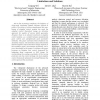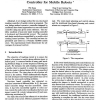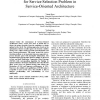276 search results - page 22 / 56 » A control theoretic approach to noncooperative game design |
IPPS
2005
IEEE
14 years 1 months ago
2005
IEEE
Due to the increasing complexity, the behavior of large-scale distributed systems becomes difficult to predict. The ability of on-line identification and autotuning of adaptive co...
ICRA
1999
IEEE
13 years 12 months ago
1999
IEEE
A new design method for non-time based tracking controller of mobile robots is presented. The new design method converts a controller designed by traditional time-based approaches ...
ITICSE
2005
ACM
14 years 1 months ago
2005
ACM
Many projects currently used in Software Engineering curricula lack both the “fun factor” needed to engage students, as well as the practical realism of engineering projects t...
JAIR
2011
12 years 10 months ago
2011
There has been significant recent interest in game theoretic approaches to security, with much of the recent research focused on utilizing the leader-follower Stackelberg game mo...
JCP
2008
13 years 7 months ago
2008
Under the environment of Service-Oriented Architecture (SOA), service users have to decide how to choose the proper provider from the candidates to obtain optimal service level. Th...



